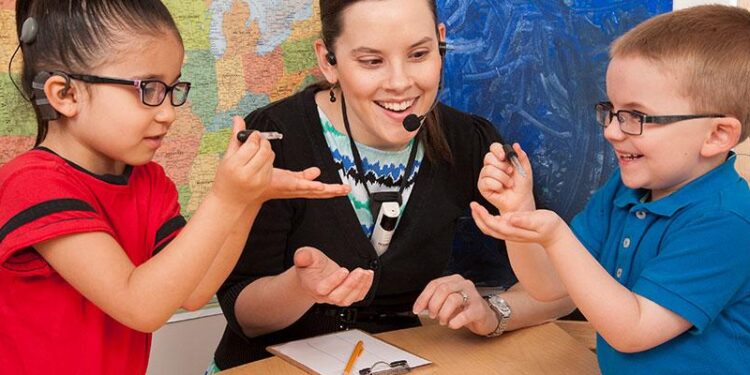Overcoming Barriers: The Journey of Deaf Students in Science
In recent times, a troubling trend has emerged that significantly impacts deaf students aiming for careers in scientific fields: the decline of federal funding dedicated to their educational and research needs. In an era where inclusivity and accessibility are crucial, the withdrawal of these essential financial resources presents a formidable obstacle for aspiring scientists who are deaf or hard of hearing. This article delves into the consequences of these funding reductions on their career prospects, sharing personal narratives, expert opinions, and examining the wider implications for diversity and innovation within science. As advocates rally for renewed support, the need for equitable access to educational opportunities has never been more pressing.
Barriers Encountered by Deaf Students in Scientific Pursuits
Deaf students face distinct challenges when pursuing careers in science that can impede both their academic journeys and professional goals. A primary hurdle is the insufficient availability of accessible resources. Numerous educational institutions do not provide adequate sign language interpreters or captioning services during lectures and laboratory sessions. This lack can result in misunderstandings or knowledge gaps that are particularly harmful in scientific disciplines where accuracy is paramount. Furthermore, there is often a shortage of qualified mentors who can effectively guide deaf students through the intricacies of scientific research and networking.
The issue is compounded by financial disparities that further hinder these students’ progress. With federal grants aimed at supporting deaf individuals studying STEM subjects being phased out, many find it increasingly difficult to fund their education and research endeavors. The resulting financial strain may force some to limit participation in vital science conferences or internships critical for career development.
| Barrier | Consequences |
|---|---|
| Lack of interpreters | Misperceptions regarding scientific principles |
| Poor mentorship availability | Limited networking possibilities |
| Cuts to funding sources | Narrowed access to essential resources and experiences |
Effects of Funding Reductions on Inclusivity Efforts
The reduction in federal grants critically undermines years of progress made towards improving accessibility for deaf students pursuing careers in science. As funding diminishes, numerous programs previously offering vital resources, mentorships, and learning opportunities face potential elimination. The repercussions extend beyond mere financial aid; they encompass a loss of important networks fostering collaboration among peers.
The impact is most pronounced within classrooms where institutions struggle with implementing necessary accommodations due to budget cuts—often leading to reduced services such as sign language interpretation or assistive technologies tailored specifically for these learners’ needs. Consequently, this creates an environment where deaf students may feel isolated from their peers which ultimately discourages them from engaging with science-related fields altogether.
Strategies for Enhancing Support Systems for Disabled Scholars
To cultivate a more inclusive atmosphere conducive to disabled scholars’ success requires academic institutions prioritizing tailored support systems focused on ongoing financial assistance alongside mentorship opportunities coupled with accessible resources designed specifically around individual needs:
- Create Targeted Funding Programs: Develop grant initiatives explicitly aimed at supporting disabled scholars while allowing extended financing options beyond standard limits.
- Mentorship Initiatives: Establish programs pairing disabled scholars with seasoned professionals who can offer guidance throughout both academic pursuits as well as career trajectories.
- Adequate Resource Accessibility: Ensure all learning materials along with facilities remain fully accessible through incorporating technology facilitating effective engagement during lessons. <
- Cultural Competency Training: Regularly conduct training sessions directed towards faculty members promoting awareness regarding challenges faced by disabled scholars while encouraging inclusive practices across campus environments .< / li >
< / ul >
Additionally , forging partnerships alongside advocacy organizations specializing within disability services proves essential . Collaborative efforts enhance available resource pools while strengthening supportive networks ultimately leading toward fairer academic landscapes . Consider exploring various partnership types :< / p >
Partnership Type
Advantages < / th >
/ tr >< td >Nonprofit Organizations < / td >< td >Access specialized support services plus advocacy efforts.< / td >< tr >< td >Government Agencies < / td >< td >Funding avenues along policy advocacy benefiting disabled scholars.< / td >< tr >< td >Industry Collaborations < / td >< td >Internship placements designed specifically targeting individuals living disabilities.< / t d > Conclusion: Key Insights Moving Forward
The obstacles encountered by deaf individuals seeking careers within sciences underscore critical intersections between accessibility issues coupled alongside dwindling funds available . As specialized program supports fade away , many aspiring scientists find themselves navigating challenging terrains characterized limited resource availability hindering growth potentiality overall . Advocacy surrounding renewed investments into supportive infrastructures remains imperative guaranteeing equitable pathways exist regardless hearing capabilities possessed amongst student bodies involved STEM disciplines moving forward .










